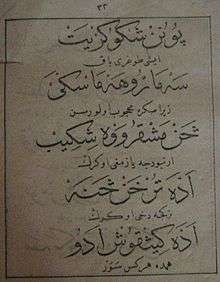Daut Boriçi
| Molla Daut Boriçi | |
|---|---|
 Cover page of the 1861 primer | |
| Born |
December 20, 1825 Shkodër, Ottoman Empire |
| Died |
November 2, 1896 (aged 70) Shkodër, Ottoman Empire |
| Nationality | Ottoman |
| Ethnicity | Albanian |
| Occupation | Teacher, imam, civil servant |
| Years active | 1848-1894 |
| Notable work | The Arabic alphabet Albanian primer of 1861 |
| Religion | Muslim |
Daut Boriçi (20.12.1825–02.11.1896), known in Turkish as Davut Şükrü Efendi[1] was an Albanian Muslim cleric and nationalist figure of the Albanian National Awakening. For most of his life he was involved in the Ottoman educational system, and is remembered for his Albanian primer in Arabic alphabet of 1861,[2] and his leadership during the League of Prizren.[3]
Life
Boriçi was born in Shkodër, back then center of the Pashalik of Scutari of the Ottoman Empire. His family originates from Boriç village near Antivari, today's Montenegro,[3] having settled in Shkodër around 1650.[4] At 8 years old he started his elementary education together with his brother Salih in the local school located in the "Old Bazaar" ( Pazar i Vjetër) neighborhood. There he was taught by Molla (Hoxha) Ferhali (1773-1844).[2] In 1839 he started learning the Arabic language and studying theology with the müderris-es of the Qafa Madrasa,[2] founded by Mehmet Pasha Plaku and administered by Mustafa Pasha Bushatli. In 1848 he was appointed as imam in the Draçin Mosque (known as Molla Dauti Mosque) where he took the name Molla Dauti.[2] He was influenced by other Muslim scholars as Salih Efendi, Mullah Ahmet Hadri, and Mulla Sylo Fakoja,[2] and became member of the ulama.[1] In 1850, he left for Istanbul and on 21 October of that year registered in the Çifte Baş Kurşun madrasa, one of the many founded by Mehmed II, followed by the Normal School.[5] There he gave theology lessons to Riza Bey Bushati, son of Mustafa Pasha. The exact date when he finished the studies is unknown. He was first appointed somewhere in Anatolia, but luckily managed to return to his home town due to an exchange with another Çifte Baş Kurşun alumni. Back in Shkodër, he started teaching in the Ruzhdie (middle) school. Also, Riza Bey appointed him in charge of his family estates and income, with a payment of 5 Ottoman liras a month.[5] In 1869 he was also elevates as inspector of the Ottoman Ministry of Education Inspectorate, responsible for the elementary education in the area.[5]
On 15 June 1878, right at the eve of the Congress of Berlin, a massive manifestation of the Shkodër population took place at the Old Bazaar. The manifestation came out with a petition which was sent to the Berlin Congress, protesting against any potential annexation of Albanian-populated territories by Montenegro.[5] Daut's name was on the top list out of 380 signatures. His name would spike out as the leader of the League of Prizren branch of Shkodër, a committee of 20 people founded on 11 July 1878.[3] The Committee played an important role in mobilizing Albanians and assisting the resistance in Plav-Gusinje, Hoti, Gruda, Antivari, and Ulcinj.
With the suppression of the League by the Ottomans, Daut was recalled in Constantinople and later exiled in Anatolia where he would work as a teacher.[3] After the accidental death of his wife, a petition from Shkodra leadership convinced the Ottoman authorities to give him amnesty. Daut returned to his hometown and was involved again in the education system.[a] In 1888 he appears as Inspector of Education of the Scutari Vilayet. In 1892 he applied for retirement, which was approved only in 1894.[5] Daut Boriçi died in Shkodër in November 1896 and was buried in the Luguçesma Mosque.
Work
His main work was the Arabic Alphabet Turkish-Albanian primer, published in 1861 in Istanbul under a pen name and no date, in order to avoid any possible persecution due to Albanian writings being prohibited by that time. A second edition came out in 1869.[5]
Another Albanian primer, different from the first, dates in 1881. Also, two unfinished works of his, an Albanian language grammar and a Turkish-Albanian dictionary,[3] are preserved in the Albanian National Archives.
In addition, Molla Daut wrote an autobiography and two diaries, one of 1884-1850, and the other of 1893-1895 period.[5]
Notes
| a. | ^ Turkish scholar Selçuk Akşin Somel mentions an alternate but less possible outcome of his exile.[1] Daut Efendi might have remained in Anatolia and served as Inspector of Education for the Vilayet of Van. This is based on the Henry Finnis Blosse Lynch's Armenia, travels and studies. Volume II: The Turkish Provinces of 1901. According to Lynch, the Vilayet of Van had as inspector a hard-working Albanian, with a good grasp of French. Numerous elementary but not only schools in the vilayet were established due to his efforts. Lynch visited eastern Anatolia in 1894 for the first time, by when Daut Efendi had already retired. |
References
- 1 2 3 Selçuk Akşin Somel (2001), The modernization of public education in the Ottoman Empire, 1839-1908 : Islamization, autocracy, and discipline, Ottoman Empire and its heritage 22, Boston: Brill, pp. 127–128, ISBN 9789004119031, OCLC 44934413
- 1 2 3 4 5 H. T. Norris (1993), Islam in the Balkans: Religion and Society Between Europe and the Arab World, University of South Carolina Press, p. 76, ISBN 9780872499775
- 1 2 3 4 5 Robert Elsie (2012), A Biographical Dictionary of Albanian History, I.B.Tauris, pp. 47–48, ISBN 9781780764313
- ↑ Historia e një familjeje mësuesish e patriotësh (The story of a family of patriots and educators), A.Dushi, 30 July 2007 (in Albanian)
- 1 2 3 4 5 6 7 Daut efendi Boriçi, dijetari i shquar islam [Daut Efendi Boriçi, distinguished Islam scholar] (in Albanian), Drita Islame, 2012-06-15